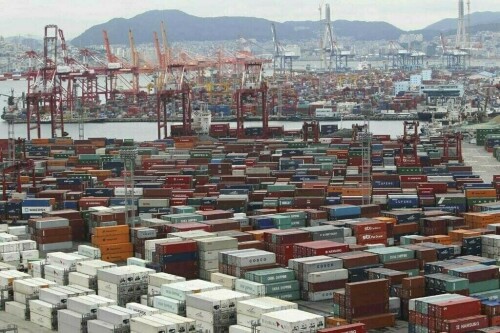Exporters Urge PM Sharif to Revive Key Tax Measures
Pakistan’s $11 billion export sector, responsible for nearly a third of the nation’s total exports, has urgently appealed to Prime Minister Shehbaz Sharif. They warn that recent fiscal policies risk undermining export-oriented industries at a crucial juncture.
In a collaborative statement, the Pakistan Readymade Garments Manufacturers and Exporters Association (PRGMEA), along with leading export associations such as PHMA, SIMAP, PSGMEA, PGMEA, PLGMEA, PCSUMEA, and the Sialkot Chamber of Commerce and Industry (SCCI), are advocating for the immediate reinstatement of the Final Tax Regime (FTR) and the restoration of the Export Facilitation Scheme (EFS) to its initial framework.
The appeal has garnered support from prominent industry figures including PRGMEA Chairman Dr. Muhammad Ayyaz Uddin and former Central Chairman Sohail A. Sheikh, Sialkot Chamber of Commerce and Industry (SCCI) President Ikram ul Haq, PSGMEA Chairman Khawaja Masud Akhtar, SIMAP Chairman Zeeshan Tariq, PLGMEA Chairman Syed Ahtisham Mazhar, PHMA Chairman Abdul Hameed and former chairman Khawaja Mushraf, PGMEA Chairman Annas Raheel Barlas, PCSUMEA Chairman Muhammad Jamal Bhutta, Majid Bhutta, Ansar Aziz Puri, and Sheikh Luqman Amin, among other significant exporters and business leaders.
The associations have voiced deep apprehension that, despite the government’s emphasis on “export-led growth,” the practical reality presents a conflicting scenario.
They highlighted that the finance minister mentioned “export” only once during the entire budget address, and that was in a negative context when discussing tariffs on imported yarn under the EFS.
The association implored the prime minister to convene an urgent meeting with key export associations and the SCCI before the budget’s enactment.
“If this situation continues, Pakistan’s most dependable source of foreign exchange earnings will suffer lasting harm.”
They underscored that the government’s goal of elevating the country’s exports to $100 billion is “simply unattainable” within the current policy framework.
“We are not requesting subsidies, concessions, or preferential treatment—we simply seek a fair environment to compete on a global scale. Regrettably, the existing policies have significantly inflated the cost of doing business and severely hampered the ease of conducting business,” the export associations affirmed.
They noted that international buyers are actively seeking long-term predictability and stability within the EFS framework, particularly as Pakistan has a chance to capitalize on business shifting away from China.
Exporters added that the elimination of the FTR and the disruption of the EFS have resulted in disarray within the industry.
The FTR, previously a straightforward and predictable tax system, has been supplanted by intricate procedures, audits, and challenges in obtaining refunds, disproportionately affecting small and medium-sized enterprises (SMEs).
Meanwhile, the EFS has become encumbered by superfluous conditions, limiting access to essential inputs and compromising export competitiveness. Business leaders emphasize the necessity for Pakistan to strategically diversify beyond cotton and pursue a more innovation-focused approach to value-added apparel exports.



Comments (0)
No comments yet. Be the first to comment!
Leave a Comment